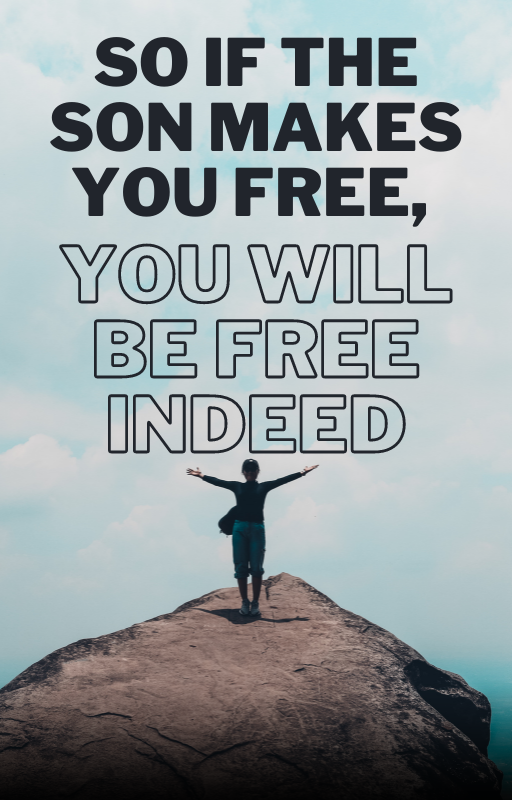HAVING THE FREE PLACE
Note: This is a slightly-emended rendition of my 2015 publication on this text – but also more complete and more timely.
John 8:31-36
Reformation Sunday
Analysis by Michael Hoy
31Then Jesus said to the Jews who had believed in him, ‘If you continue in my word, you are truly my disciples; 32and you will know the truth, and the truth will make you free.’ 33They answered him, ‘We are descendants of Abraham and have never been slaves to anyone. What do you mean by saying, “You will be made free”?’ 34Jesus answered them, ‘Very truly, I tell you, everyone who commits sin is a slave to sin. 35The slave does not have a permanent place in the household; the son has a place there forever. 36So if the Son makes you free, you will be free indeed.
“Jesus takes our place of crushed non-existence into his hands, and hugs us into a place that we can call home – meaningful home and belonging – with God, as God’s treasured own.”
Diagnosis: The Bondage of Religion, or Un-religion, Whatever
Step 1: Initial Diagnosis (External Problem): Protesting the Truth
Reformation Sunday is a good day to consider the truth – the truth of Jesus, “the truth [that] will make you free.” It is important, in fact, for the sake of the very foundation of the household of the church. Perhaps too often, we have missed this truth, even in singing majestic hymns like “The church’s one foundation is Jesus Christ her Lord” or “A mighty fortress is our God.” While we may sing with bravado, as in fact we should, in our institutional or even congregational pride we may not have had the “one foundation” that makes the fortress mighty – namely, the Lord Jesus Christ and his truth that makes us free. As such, that makes us no better than the bristling critics of Jesus, as well as so many others in our world: “We are descendants of Abraham…. What do you mean, ‘you will be made free’?” What they are really protesting is not freedom per se, but that Jesus’ truth is the means for that freedom.
Hence, in this age when “truth” itself is often suspect, we may have presumed too much by relying on any sense of freedom in our tribal identity (whatever denomination, or non-denomination, even Lutheran). Maybe we still do. But then we do not see the hardly-freeing evidence of what is happening to our institutional religion (whatever denomination, or non-denomination, even Lutheran) – that it is indeed crumbling all around us. Is it a time to bolster the breaches of our institutional fortress? Or is it a time to ask about our foundation?
Given some of these perceived characteristics of the churchly household, many – even some within the church itself (usually our young), who can see through this much at least – may have already decided “church” is not really the place to find freedom. They may even go looking for a more freeing place. Where they look for it, however, is so-often based on the foundation of their own individualism and intuitions – something that might seem for them to claim an ally in the very founder of the sixteenth century reformation himself, Martin Luther, especially in his “faith alone” humble protest with the church of his own time. Still, Luther, for all his liberating and reforming of the church, would also ask about faith’s foundation – namely, is it the Lord Jesus Christ and his truth that makes us free?
Hence, even as these liberated entrepreneurs of freedom-seeking go looking for a new religious identity, they cannot seem to escape the same dynamics of tribal identity – finding only people who think the same as they do, and with all the tribal bristling that comes with it. They, too, are limited to that place – and remain unfree from it, no matter how much they bolster the breaches of their own intuitional fortress. Is it time to ask about our foundation?
Step 2: Advance Diagnosis (Internal Problem): Slaves
Truth is, however, we all have things more in common than we realize. We are all slaves – slaves, yes, to our tribal identity and to our own modern-day bristling to the meaning of truth. But most of all, we also have in common the fact that we are not free – and precisely because we reject “the truth [that] will make you free.” We go about our daily lives with phones planted to our ears or thumbs text-messaging or scrolling at a fast and furious pace, busying our lives with whatever we have to and whatever it costs, demonizing those who are not like us, living out a tribal identity that we claim is truly ours, and thinking all along that we are free. Are we, really, free? If this is “religion,” who needs it? (Truth is, Jesus would ask the same question, but he may go unheard with all our background noise.) The root problem of our state of being is that we are all enslaved. “Everyone who commits sin is a slave to sin.” Left unexplored in our own questioning sense of truth is the sinful sorry state of our existence. And where this all leads – the estrangement, the anomie, the fear, the despair – is the truth we so often seek to avoid. Our truthful place? Slaves to sin, lost in despair.
Step 3: Final Diagnosis (Eternal Problem): No Permanent Place
Jesus’s truth, therefore, accurately describes us all – whether religious, un-religious, or whatever – by what we do not have: “The slave does not have a permanent place in the household.” Our place has been lost. Maybe it’s been given to another. Either way, what we “have” is no lasting place, we lose out, and we most certainly do not have freedom. This is not some truth of some future afterlife. It is the truth we already “have” now in the land of despair and frustration and confusion and struggle for meaning. And if we ask, “Where is God?” Truthfully? No answer.
Prognosis: The Freedom of Christ
Step 4: Initial Prognosis (Eternal Solution): Placed in Our No Place
But God knows this lack of permanence well. In fact, God experienced it first hand in Jesus: This One who also has faced the same threat of impermanence, experienced the worst of it in a place we would not likely put at the top of our “best places to visit” – Golgotha. Golgotha is the pits. But here’s the catch. It wasn’t what Jesus deserved; Golgotha (that is, death) is our pits that Jesus has accepted intentionally, asking as we do, “My God, my God, why have you forsaken me?” We have to wait a few days to hear the full answer to that query. But what is powerful is how in this moment Jesus is empowering us, by taking our place – sharing our lot, such as it is – so that we can, instead, have his lot: a lasting permanent place of promise forever. His life given for ours, losing so that we may win and win by losing. That is the cornerstone (the one foundation), where God’s legal permanency is overcome by God’s promising new beginning.
Step 5: Advanced Prognosis (Internal Solution): Children
Instead of being abandoned – living by some vague impression that we have to be “true” to ourselves (whether that be our heritage or our disinterest in the divine) – we become God’s own kids. Now we have something we didn’t have before this placeless One came to change life for our good. He takes our place of crushed non-existence into his hands, and hugs us into a place that we can call home – meaningful home and belonging – with God, as God’s treasured own. God reconciles us in Christ in this common humanity. Trust starts to re-kindle. Hope starts to emerge.
Step 6: Final Prognosis (External Solution): Professing/Confessing our Freedom
And maybe then, our voices crack a bit, as we sing the words with new force and energy, “the church’s one foundation is Jesus Christ her Lord” – the only foundation on which “A mighty fortress” can endure, since he has known the battle of forces that rage within and without. I can trust this One, after all, because he’s knows my slavish no-place, lived in it for me, died for me, and rose again for me. So the foundation is not me, not some contemporary I have idolized, not some saintly ancestor like Martin or Abraham (all of whom knew better anyway, and lived by faith), but the One who came into my no-place and somehow died it out of existence and rose again so that I may be valued at home, with God. He gives being again, regardless of all that tribal-stuff all around me, sometimes impinging on me and within me, even mortifying me. Truthfully, though, Jesus makes me free – makes us all free.





You must be logged in to post a comment.